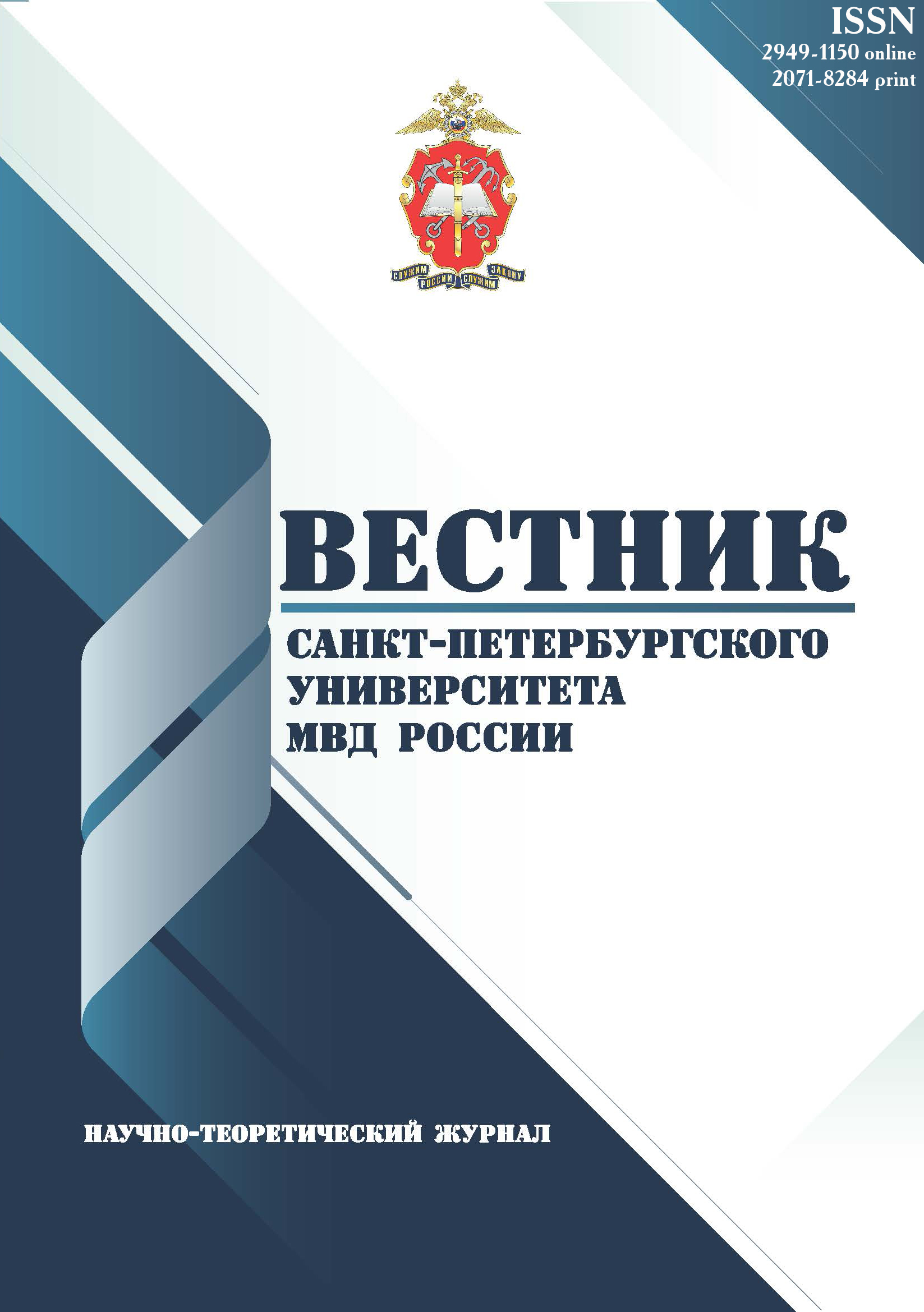Voronezh, Voronezh, Russian Federation
Voronezh, Voronezh, Russian Federation
UDC 378
UDC 37.015.31
CSCSTI 14.35
Introduction. This research examines the multidimensional issue of formation of the readiness of future officers of law enforcement agencies to effective decisionmaking in various conditions of professional activity, including extreme and dynamically changing circumstances. The study is characterised as relevant and timely. The purpose of this article is to present the findings of the study that focuses on a specific aspect of the aforementioned issue – the method of mental representation in the training and education of cadets as a tool to assess the readiness of law enforcement officers to make effective decisions. This method is used in the training of future officers of the Russian Army in the educational process in military universities. Research methods. The following methods are used: methods of abstraction and concretisation, logical generalisations, theoretical and system-structural analysis, study and generalisation of scientific sources, and pedagogical experience. Results. In the context of the methodology of professional education, the potential of using the method of mental representation in training and teaching at different stages of professional training of future military specialists are established. Additionally, the importance of the formation of mental representation for effective decision-making in the conditions of military-professional activity is substantiated.
mental representation, readiness for decision-making, visual-active thinking, training and education of cadets, method of mental representation
1. Sinchenko G. Ch., Veklenko S. V. Metodologiya dissertacionnogo issledovaniya (sem' soobrazheniy dlya soiskateley) // Nauchnyy vestnik Omskoy akademii MVD Rossii. 2006. № 2 (24). S. 53–57.
2. Nureev R. M. Vechnaya problema – sovershenstvovanie metodologii // Journal of Institutional Studies (Zhurnal institucional'nyh issledovaniy). 2010. T. 2, № 3. S. 4.
3. El'chaninov V. A., Fedyukin V. P. Negativnaya metodologiya v morali // Izvestiya Altayskogo gosudarstvennogo universiteta. 2014. T. 2, № 2. S. 227–231. https://doi.org/10.14258/izvasu(2014)2.2-44.
4. Serikov V. V. Ideya, zamysel i gipoteza v pedagogicheskom issledovanii // Obrazovanie i nauka. Izvestiya Ural'skogo nauchno-obrazovatel'nogo centra RAO. 2010. № 10 (78). S. 30–42.
5. Pedagogika i psihologiya: aktual'nye problemy i perspektivy issledovaniy na sovremennom etape : monografiya / Baybarodskih I. N., Belyak E. L., Davydova N. N. [i dr.]. ; pod red. Yu. D. Ovchinnikova, R. K. Serezhnikovoy. Samara : Ofort, 2016. 196 s.
6. Prohorov A. O. Mental'nye reprezentacii psihicheskih sostoyaniy : monografiya. Moskva : Izdatel'stvo «Institut psihologii RAN», 2021. 186 s.
7. Sergienko E. A., Ulanova A. Yu., Lebedeva E. I. Model' psihicheskogo : Struktura i dinamika. Moskva : Izdatel'stvo «Institut psihologii RAN», 2020. 503 s.
8. Holodnaya M. A. Psihologiya intellekta. Paradoksy issledovaniya. 2. izd., dop. i pererab. Sankt-Peterburg : Piter, 2002. 264 s.
9. Kubryakova E. S., Dem'yankov V. Z. K probleme mental'nyh reprezentaciy // Voprosy kognitivnoy lingvistiki. 2007. № 4 (13). S. 8–16.
10. Kant I. Kritika chistogo razuma / per. s nem. N. O. Losskogo. Moskva : Akademicheskiy proekt, 2020. 567 s.
11. Titov A. A. Myshlenie kak process i kak deyatel'nost': analiz filosofsko-psihologicheskih issledovaniy myshleniya // Pedagogika i psihologiya obrazovaniya. 2020. № 1. S. 180–197. https://doi.org/10.31862/2500-297X-2020-1-180-197.
12. Klopov S. A., Mamchur A. M. Formirovanie upravlencheskogo myshleniya buduschih oficerov: teoreticheskiy analiz i tehnologicheskie resheniya // Vestnik Saratovskogo gosudarstvennogo tehnicheskogo universiteta. 2007. T. 1, № 1 (21). S. 234–238.
13. Laenko L. V. Kategoriya mental'noy reprezentacii: rezul'taty teoreticheskogo i metodologicheskogo poiska // Vestnik Voronezhskogo gosudarstvennogo universiteta. Seriya: Lingvistika i mezhkul'turnaya kommunikaciya. 2007. № 1. S. 5–12.
14. Romanova M. A. Potencial kak obschenauchnoe ponyatie // Innovacii v obrazovanii. 2011. № 2. S. 113–125.
15. Suncova Ya. S., Meshkov I. Yu. Fenomeny vybora i prinyatiya resheniya v psihologicheskoy nauke // Vestnik Udmurtskogo universiteta. Seriya «Filosofiya. Psihologiya. Pedagogika». 2022. T. 32, vyp. 4. S. 395–404. https://doi.org/10.35634/2412-9550-2022-32-4-395-404.
16. Vertaev A. V. Metod konkretnyh situaciy kak sovremennaya informacionnaya tehnologiya v obrazovatel'noy deyatel'nosti vuzov vnutrennih voysk MVD Rossii // Psihologiya i pedagogika: metodika i problemy prakticheskogo primeneniya. 2013. № 34. S. 119–123.
17. Dmitrieva T. V. Cennostno-smyslovoe vospitanie studentov kak pedagogicheskaya problema // Vologdinskie chteniya. 2010. № 78. S. 185–192.















